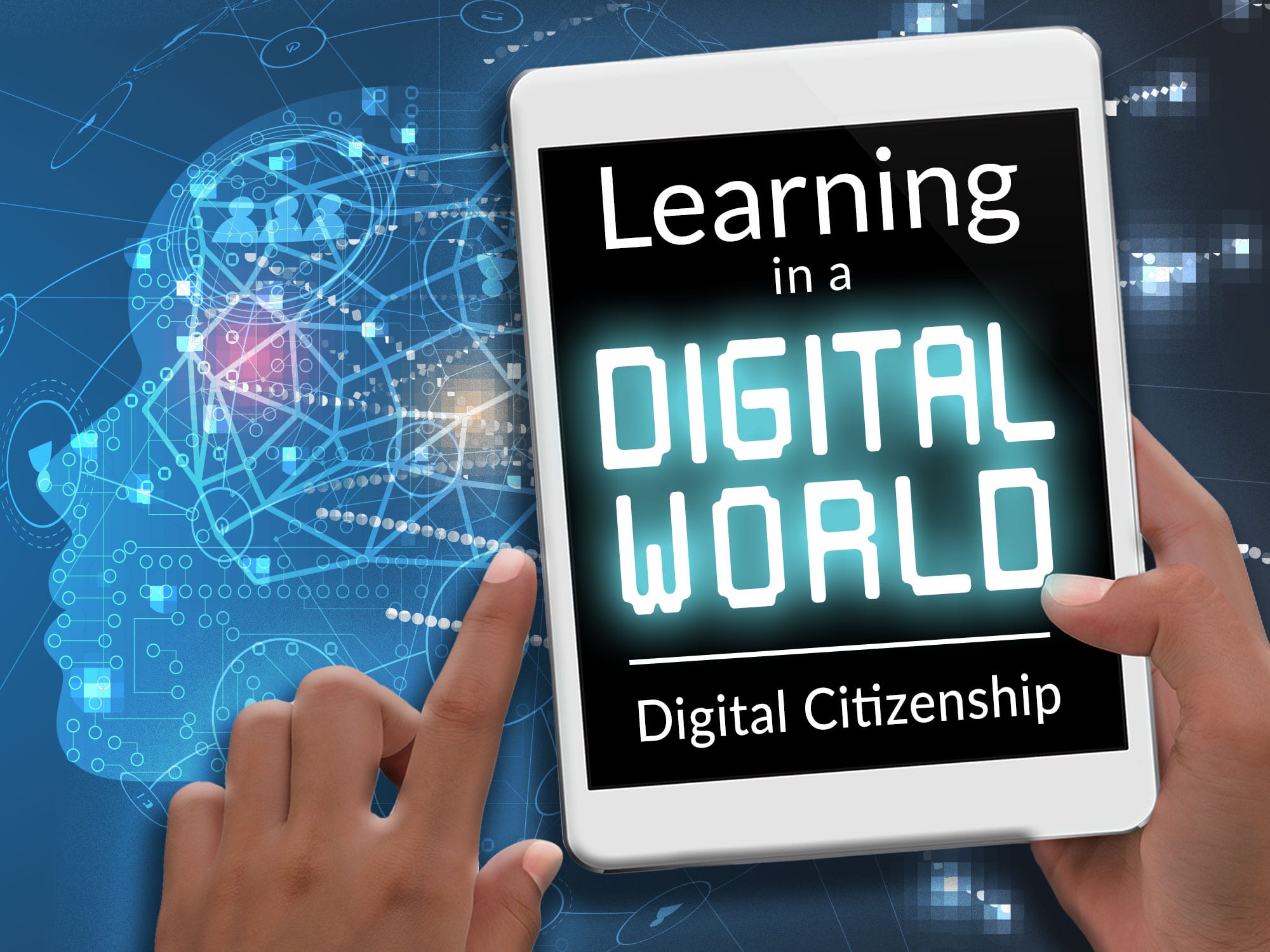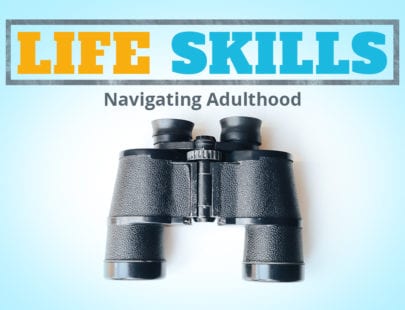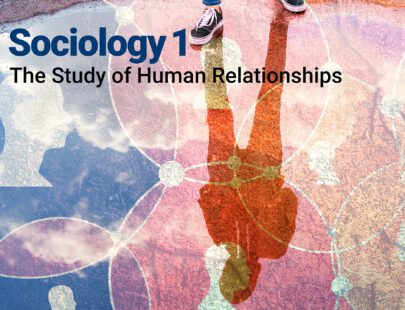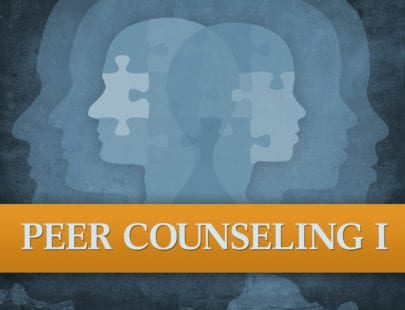
Learning in a Digital World: Digital Citizenship
We use technology to communicate with friends and family, find never-ending entertainment options and do our schoolwork. Discover what it means to be a responsible digital citizen, expand your digital literacy, and become a successful online student. Consider the best ways to find, create, and share information, learn to maximize information and communication technologies, and explore digital content creation, from emails and blogs to social media, videos, and podcasts.
Units at a Glance
Unit 1: Digital Citizenship
It’s no secret that technology is continually growing and changing. We live in a world fueled by digital media. In fact, many of us have technology constantly with us at all times, whether we have a cell phone on us, wear a smartwatch, or carry a tablet around. Our growing world of innovation is an exciting thing! Technology is not just for our personal enjoyment. Digital technology can help us advance our knowledge, skills, and overall well-being. But, how do we use technology to effectively promote our growth? How can we find success online? We have all been given a great opportunity with the amount of technology that surrounds us. Let’s dive in and see how we can successfully use technology to learn, grow, and take full advantage of all that the digital world can teach us.
What will you learn in this unit?
- Describe what it means to be a digital citizen
- Discover areas where you leave a digital footprint
- Discuss the importance of independence in online learning
- Explain how to approach an online course
Unit 2: Online Safety
Do you know how to spot a threat online? Are you familiar with some of the dangers that come with being in the digital world? Also, have you ever thought about who you are online? What does the way you portray yourself online say about you? Would your friends and family be able to connect your virtual presence with your actual self? If you’re not sure, don’t worry! We will explore all of these questions in this unit. We’ll learn how to be on the defensive when it comes to online safety, we’ll discover who we really are online, and we’ll determine if that’s someone we truly are and really want to be.
What will you learn in this unit?
- Explain how to use the internet safely
- Describe ways to spot a possible online threat
- Evaluate your online identity
- Identify ways to improve your online presence
Unit 3: Communication and Collaboration
How do you keep in contact with your family and friends? Do you call them on the phone? Do you video chat with them to be able to see their reactions? Do you send them a text message with the emoji that best matches your current mood? Communication has come a long way from the days of having to send letters through the post office. The digital world has introduced so many different ways to be able to communicate with others all around the world. Let’s take a look at some of the ways in which we can digitally communicate and how we can use those tools to improve our online learning experiences.
What will you learn in this unit?
- Discuss different tools that enable online communication and collaboration
- Explain how to set up a successful video call
- Discuss how to effectively communicate with teachers and peers online
- Describe proper online etiquette
Unit 4: Digital Literacy
Digital literacy is being able to find, evaluate, utilize, share, and create online content using different types of technology and the internet itself. So, while being a digital citizen is who we are online, digital literacy is the knowledge of what we do online. It’s knowing how to successfully use all aspects of the internet to the best of our ability. As a student, being able to apply all aspects of digital literacy will help us to be the best students we can be. Throughout this course, we have already discussed several parts of digital literacy, such as writing emails and messages, using video calls, and staying safe online. Let’s now discuss some of the areas we haven’t touched on yet, including focusing on researching and discovering information on our own online.
What will you learn in this unit?
- Define digital literacy
- Describe the different steps of the research process
- Navigate through each step of the research process
- Discover how to find credible information online
Unit 5: Study Skills
Learning in a digital world gives you many freedoms. You have the ability to learn from anywhere, do your work on your own time, and learn and take notes however you want. But, with all of this independence comes responsibility. To be a successful online student, you are going to want to come up with a plan on how to tackle all of these freedoms. This unit is full of tips and tricks on how to plan out your learning life so that you can be an efficient and successful student.
What will you learn in this unit?
- Find and create a designated study space that will help you to create better study habits
- Discuss how to get organized and manage your time wisely
- Discover how to take better notes, as well as online tools which will help improve your notetaking
- Describe different ways to prepare for tests and quizzes
Unit 6: Content and Copyright
As we continue to grow as digital citizens, it’s time to focus in on one of the Ps we talked about earlier—permission, and all the rules that come along with online content. It’s easy to see something you like online, copy it, and present it as your own. But just because it’s easy to do, it doesn’t make it right. With all of the content that is out there in the digital world, it’s hard not to be inspired by something you see and want to use it for your own purpose. So where is the line telling us what is OK to use and what isn’t OK? Let’s start to explore the rules surrounding online content and how we can apply those rules to content that we create.
What will you learn in this unit?
- Describe what the copyright law entails
- Explain how you can apply fair use to the information you want to use
- Describe the different types of Creative Commons licenses that are available
- Define remixing and explore copyright issues related to remixing content
Unit 7: Your Learning Process
Learning and taking in information isn’t a cookie-cutter, one size fits all type of skillset. Just as every person is different so is the way they learn. As an online student, you take most of the control in participating and going through your studies, so you should also take control in how you take in and process that information. It’s time to fine-tune your study skills and habits and find purpose in what you’re learning so you can take your education to the next level.
What will you learn in this unit?
- Define study agency and take control in where, when, what, and how you learn
- Describe ways to connect with what you are learning
- Discover different learning styles that can guide you to how you learn best
- Identify your own learning style
Unit 8: Digital Well-being
It’s time to move on to the last piece of the puzzle in learning in a digital world. Together we’ve put together the parts of how to be a successful online student. We discussed all the ways in which we can work with the elements that surround us. We’ve talked about different technologies, work spaces, and online exploration, yet we didn’t discuss the element which is us. We still need to discuss how to take care of ourselves, so that we are able to perform academically. Let’s discuss how to keep ourselves motivated throughout this whole online learning process. Then, we will come together and see how everything we learned, and how every piece of the puzzle, will help us to not only be successful digital learners now but how it will stay with us as we head out into our lives beyond this course.
What will you learn in this unit?
- Describe how to improve on everyday life tasks to keep you in tip-top study shape
- Explain the importance of proper study breaks
- Discover ways to stay motivated throughout an online course
- Describe how the skills in this course can apply throughout your life
Required Materials
- Digital Camera – either camera phone, iPad, computer camera – as long as image can be recorded and uploaded to computer
- Paper and colored pencils if students chooses to hand draw certain activities.
If you do not already have access to these movies, you may consider other sources such as your local library.
Note: Timestamps referenced throughout the course apply to standard editions of the applicable film and may not align with any extended versions.



